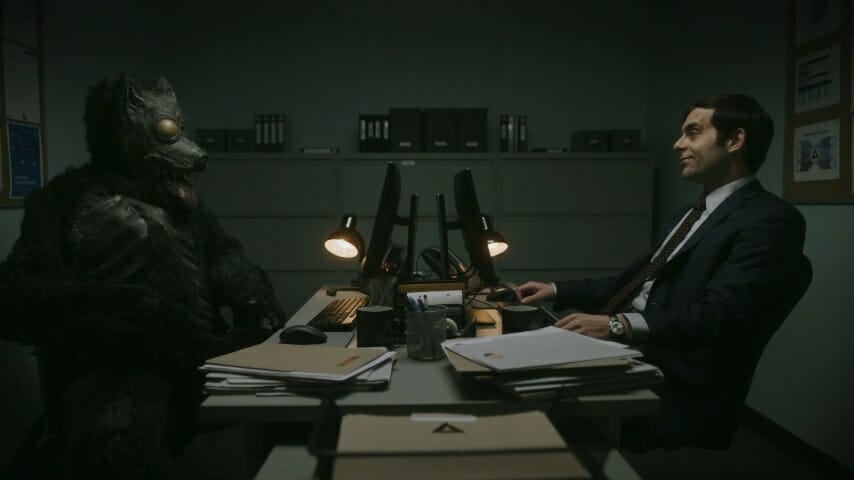Corporate‘s Jake Weisman on Using Humor to Cope with Depression and Suicidal Thoughts
Photos courtesy of Comedy Central
TW: This interview includes frank conversations about depression and suicide. If you are feeling anxious, lonely, or overwhelmed—or you just need to talk to someone—please reach out to professionals like those at the National Suicide Prevention Lifeline.
The Comedy Central series Corporate is the TV equivalent of a primal scream for anyone who has ever had a desk job that seems to slowly drain their soul. Set in the dank, windowless offices of a (definitely) evil corporation, the show—which is currently in its third, and final, season—has mocked everything about modern white-collar culture, from freezing buildings to the need to end every sentence of a work email with an exclamation point.
The show’s macabre tone also means that several of these jokes are punctuated with sarcastic commentary about the human existence, depression and taking one’s own life—lines that are usually uttered by co-creator and co-lead Jake Weisman’s character, who is also named Jake. And things are taken up a notch for this season’s second episode, which aired on July 29. Titled “Black Dog” as a reference to oft-used metaphor for depression;, the episode focuses on the character Jake’s long history both with depression and his reluctance to attempt to manage it.
Weisman, who also wrote the episode, told Paste that its thesis came while he was promoting Corporate’s second season. This was also when he realized he needed to be more proactive about his own self care because, well, “making and promoting a show definitely allows you to look at yourself and your anxiety and realize you need to make a change.”
Weisman is lucky; he says he got on medication and the first one he tried had positive results. He says someone had told him that the right meds can feel “like a layer of sludge [was] just wiped off the top of your brain” and he still remembers when he realized that that person was right.
“I’ve definitely just enjoyed life a lot more—or, I will say more of what it is, is that I’ve hated it so much less,” he laughs.
In “Black Dog,” the fictional version of him goes on a similar trajectory. It opens with the character’s 12th birthday, the night of which when he is visited by the titular Black Dog, which Weisman says was designed to look like the “horrific” yet “cool” rabbit from the movie Donnie Darko, and is voiced by Bob Odenkirk. More important, it’s a creature that will now forever haunt him with negative commentary and drastically change his outlook on life. (Weisman says that Odenkirk, who has a past working relationship with Corporate co-creator Pat Bishop, was asked to do the part because they needed someone who understood comic timing even when discussing something so serious and because they wanted “a familiar voice, but you’re not sure [exactly who it is], because that’s what depression is”).
At the end of the episode, Jake takes action and tries medication. The Black Dog is still very much there, but it is muzzled.
“I would never want to write something because I think it’s important—I think that that’s pandering—but I would want to write something because it’s true,” Weisman says.
It helps that he feels like he has completed the theoretical 10,000 hours it takes to master this subject, he says. “So my worry wasn’t that I couldn’t portray it accurately, or in a way that wouldn’t hurt people … my worry was to do it in an interesting enough way that felt unique and also something that could allow people into it.”
